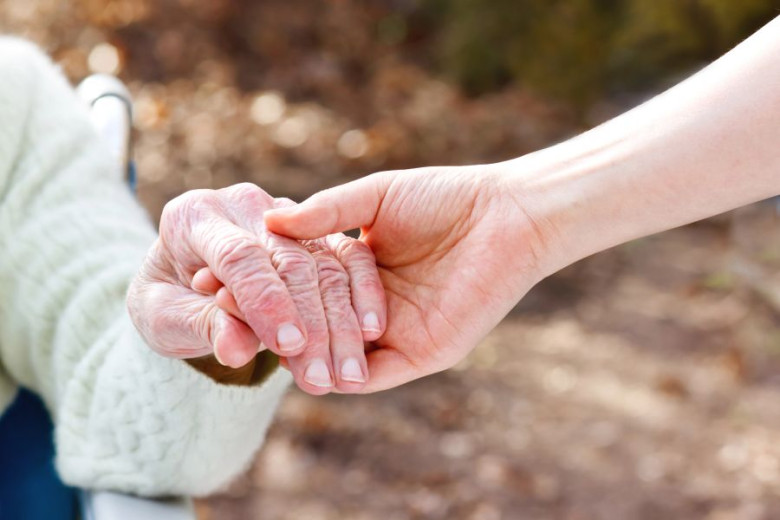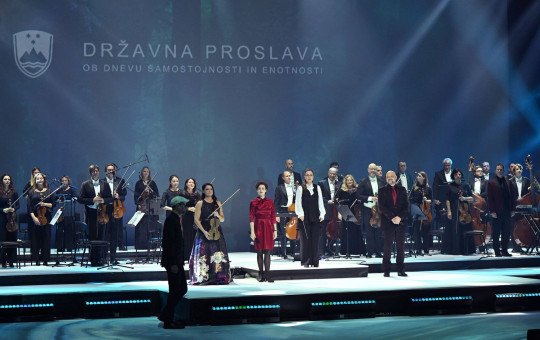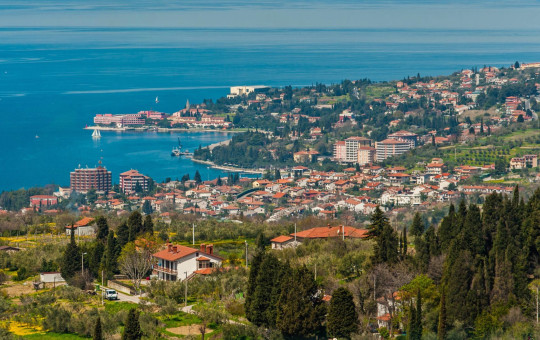Date: 5. August 2025
Time to read: 2 min
One in five residents of Slovenia is already aged 65 or older. Across Europe, demographic changes are rapidly reshaping societies. While most people wish to spend their later years in good health, with independence and active engagement, the reality often differs. Old age can bring increased needs for care and support.
Today, life expectancy at the age of 65 exceeds 20 years, yet many people spend a significant portion of this time coping with chronic illnesses and daily life limitations. Ensuring a safe, dignified and high-quality old age for all is therefore a fundamental task of modern society. Slovenia is rising to this challenge by developing a comprehensive long-term care system. Only a well-functioning care system will guarantee that even the most vulnerable among us can live with dignity and receive appropriate support.
Looking ahead, by 2050, the European Union is expected to have nearly 27 million people aged 85 or older, with the number of centenarians projected to rise to almost half a million – up from 96,600 in 2019.
-
 As Europe ages, the need for long-term care is growing. In the EU, the number of people requiring such care is expected to rise from 30.8 million in 2019 to 38.1 million by 2050. Photo: Depositphotos
As Europe ages, the need for long-term care is growing. In the EU, the number of people requiring such care is expected to rise from 30.8 million in 2019 to 38.1 million by 2050. Photo: Depositphotos
-
 Just over a quarter of EU citizens aged 65 and over report serious difficulties with personal care or household tasks. Photo: Depositphotos
Just over a quarter of EU citizens aged 65 and over report serious difficulties with personal care or household tasks. Photo: Depositphotos
Towards a society of solidarity
After years of careful coordination, Slovenia is introducing the long-term care system – the third pillar of social security alongside pension and health insurance. This system is designed not only for the elderly, but for anyone over the age of 18 who requires assistance with self-care.
It serves all individuals who, due to illness, age-related frailty, injuries, disabilities, or cognitive impairments, are dependent – either for an extended period or permanently – on the help of others to carry out basic and supportive daily tasks.
Built on the principle of intergenerational solidarity, the system is funded through mandatory contributions: employees and employers each pay 1% of gross wages, while pensioners contribute 1% of their net pension. This model guarantees access to essential services for everyone in need, regardless of social status.
Rights and services tailored to individual needs
Slovenia’s long-term care system includes a broad range of rights and services designed to help individuals preserve their dignity and maintain the greatest possible independence. Beneficiaries can access these services by submitting an application, after which a care adviser visits them at home to assess their level of independence using eight criteria, including mobility, self-care ability and mental health. The total points assigned determine the individual’s placement into one of five long-term care categories. The higher the number of points assigned, the greater the support they are entitled to receive.
Carer for a family member
Starting January 2024, family members who provide care for their relatives, can officially become recognised carers, receiving payment for their work along with the necessary support. This opportunity is also open to retired family members.
Home help
An essential component of long-term care is the right to home help. Beneficiaries can receive assistance at home with daily tasks, such as household chores, shopping, meal preparation, personal hygiene and mobility. Home care also includes basic health services, such as health monitoring and help with preparing and taking medication.
Daytime long-term care
Individuals can receive professional support and assistance during the day (between 6.00 a.m. and 10.00 p.m.) at a care facility and return home in the evening. This type of care serves as a valuable complement to home help.
Institutional care
For those requiring institutional care, such as in a home for the elderly, long-term care covers services including assistance with eating and drinking, personal hygiene, dressing and undressing, mobility, medication management, health monitoring, and similar needs. These services are funded through compulsory long-term care insurance. Residents will only be responsible for the costs of food and accommodation. This marks the most significant change compared to the current system. The cost of standard accommodation in homes for the elderly will not be allowed to exceed the amount of the guaranteed pension.
Cash benefit
Individuals receiving care within their family or the wider community, are entitled to a monthly cash benefit ranging from EUR 89 to EUR 491, depending on the level of care required.
Additional services
Beyond basic assistance, two supplementary services are available: e-care and services aimed at maintaining and strengthening independence. E-care promotes safer living at home by providing beneficiaries with alarms or sensors that operate 24 hours a day, detecting falls, smoke, and other hazards. In case of an emergency, a call for help is automatically sent to either the assistance centre or the carer. Services designed to maintain and strengthen independence help individuals stay active and self-reliant for as long as possible. These include physiotherapy, psychosocial support, and advice on adapting the home environment.
-
 The risk of developing long-term care needs is higher towards older age, when people are more likely to experience functional ability decline. Photo: Depositphotos
The risk of developing long-term care needs is higher towards older age, when people are more likely to experience functional ability decline. Photo: Depositphotos
-
 Long-term care services will be introduced gradually, with staffing levels and service capacity adjusted to actual needs on the ground. Photo: Depositphotos
Long-term care services will be introduced gradually, with staffing levels and service capacity adjusted to actual needs on the ground. Photo: Depositphotos
Historic step
Establishing a long-term care system is a demanding and far-reaching endeavour; at the same time, it marks a historic milestone – not only for the state but primarily for its residents.
This system is designed for everyone who seeks security, support and dignity in old age or in times of illness.
Today, our grandparents, friends, parents and neighbours rely on this care; tomorrow, any one of us may need it due to illness, injuries or ageing. In Slovenia, caring for the most vulnerable goes far beyond a social obligation. It is an expression of humanity and solidarity – a core value that reflects the strength and unity of our community.







